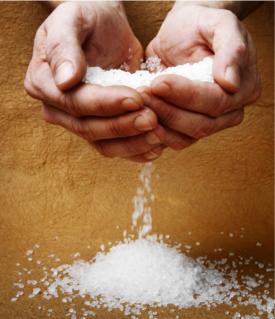5th Sunday in Ordinary Time - Salt of the Earth - Light to the World
Discipleship requires work, lots of sacrifice, discipline and love. It takes heroic love to make the teaching of Jesus concrete and real in our relationships. Today our scriptures again begin with the prophet Isaiah - and we listen as he reminds us of an important aspect of our call to conversion of heart: the presence of God in this world will be evidently seen when we "...share bread with the hungry, shelter the oppressed and the homeless, clothe the naked when we them and do not turn our back on our own." The prophet goes on to say that to those who do these things, "light shall rise for you in the darkness and the gloom shall become for you like midday."
 This image of light connects us to the "deeds" spoken of in today's gospel. Matthew tells us that the effectiveness of our discipleship will be gauged on how we respond to the hungry, thirsty, stranger, naked, sick and imprisoned. We have indeed been called "blessed" by the Lord. But we don't do our good works just to please God, or to gain esteem in the eyes of others. We do them because God has already done something within us and we are His reflectors; we conduct God's light to others. People will see by this light; and what they will see will be God Himself.
This image of light connects us to the "deeds" spoken of in today's gospel. Matthew tells us that the effectiveness of our discipleship will be gauged on how we respond to the hungry, thirsty, stranger, naked, sick and imprisoned. We have indeed been called "blessed" by the Lord. But we don't do our good works just to please God, or to gain esteem in the eyes of others. We do them because God has already done something within us and we are His reflectors; we conduct God's light to others. People will see by this light; and what they will see will be God Himself.
We have been given a new life and this gives us new ways of seeing. We observe what others ignore; we readily go where others stand off; we speak out when others remain silent; we keep on, when others would drop away. Living the Gospel is a constant challenge - one that makes us reexamine our mental attitudes, our actions, our speech, and many of the prejudices we grow up with.
If we listen carefully to the words of Jesus, it is very clear that he wants us to exclude no one from our love - not the beggar, the borrower, the adulteress, the leper, the widow, the poor, the orphan, the enemy. Each of us can make our own list of the "most unwanted", those whom we find most difficult to forgive, to feel sympathy for, to offer compassion to.
Jesus tells us it makes no difference. Every single person is entitled to a fundamental respect and concern. There is none who is "unwanted." Everyone is called to salvation and holiness. Likewise, everyone should find in us the same compassionate, all-inclusive love that they would find in Jesus.
Hopefully, we can grow into becoming more fully authentic disciples. And as we do, Jesus tells us, we are noticed, like salt in food; like light in the dark. With his life in us, we don't have to "become" salt and light, we "already are" salt and light. We can't deny it or hide it; or at least we shouldn't. When being a Christian gets difficult, when we face criticism for our positions, concerns and action for the needy, we are reminded that we are not trying to become someone we are not. Instead, we are drawing on the inner reality of who we really are. Salt and light is who we are right now and that is how we act.
The world has too many areas of darkness that need our light - even though we may sometimes feel like our batteries are running out. There is so much emptiness and tastelessness in this world that needs our salt - even when we believe the shaker is empty.
For Jesus, the presence of God's Spirit is evident in human interactions of mercy, compassion, forgiveness, sharing, working for justice and peace, respect and joy. When you see these things, you know God's Spirit is here. When you do these things, you know God's Spirit is here in you. The "good news" is that in everyday, decent human interaction all people encounter the sacred, the Spirit of God at work.
This is what the reign of God is all about. This is where we are to know, experience and build up the kingdom of God.
We have been called by Him whose life permeates all things to be the salt that seasons the lives of others; we have been called by the Light to be the light which dispels the continuing darkness.